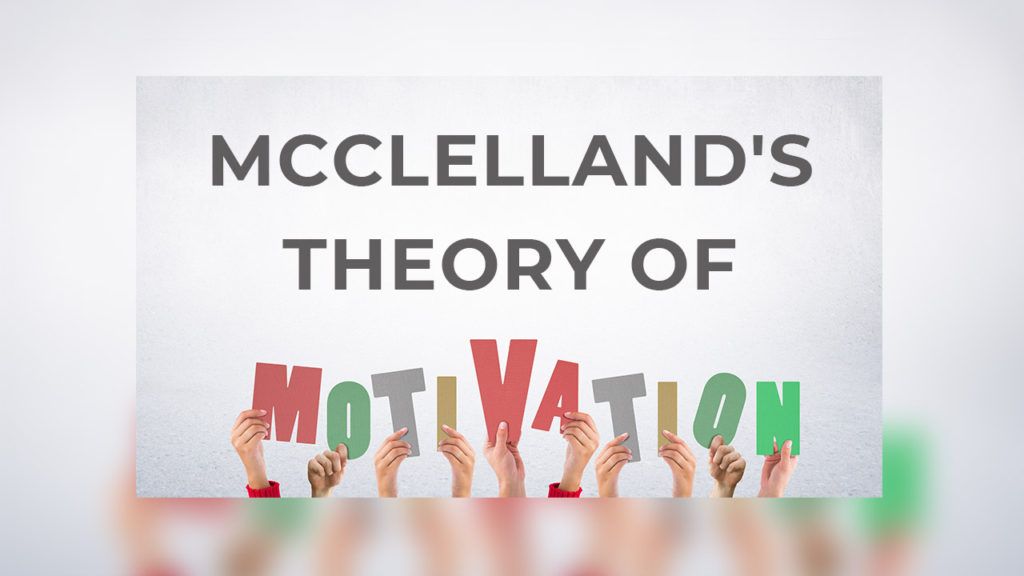
McClelland’s theory of motivation talks about three major needs that affect human behavior. This article describes how each of these needs shapes behavior.
Motivation is the process of stimulating individuals to begin, sustain, and finish their activities. It lies at the core of goal-directed behavior. McClelland’s theory of motivation is one of the most prominent theories of motivation. He explains the process by which individuals choose goals to pursue.
David McClelland proposed that there are three basic needs that guide and mold human behavior. They are:
- The Need for achievement
- Need for affiliation
- The Need for power
Need for Achievement

The need for achievement is the first need described in McClelland’s theory of motivation. In fact, this need gained so much popularity that the theory is often referred to as the need for achievement theory.
The need for achievement refers to the human need to achieve or accomplish something great in life. For instance, an MBA student might dream of getting a high paying job, a doctor might aim to succeed in all his or her surgeries and so on.
Individuals with a high need for achievement are highly creative and innovative. They are efficient in finding novel and economical ways to finish their tasks.
Such people are also very realistic in terms of goal-setting. This is primarily because they have a good understanding of their abilities and skills. They also prefer activities and tasks which are optimally difficult. This means that their goals are neither unrealistically difficult nor too easy. The goals are such that they challenge the individual but at the same time are achievable.
People with a high need for achievement also appreciate feedback. This is because they need to hear from others that they are doing a good job. They also appreciate constructive negative feedback.
Leaders and managers like employees who have a high need for achievement because they are reliable, efficient and are usually good at their jobs. However, they are often poor team players. This is because they need to be appreciated for their job and they are not tolerant of inefficiencies in the work process.
Need for Affiliation

The need for affiliation refers to the drive to have pleasant inter-personal relationships with others. This need makes individuals interact in social situations and make friends.
Individuals with a high need for affiliation are extremely social and enjoy working in teams. This is because they have a strong need to build long-lasting relationships and to be liked by others. Hence this need lies opposite to the need for achievement. Very few people would have high levels of both these needs. In general individuals with a high need for achievement have a low need for affiliation.
Individuals who have a high need for affiliation conform with the group and organizational norms. They are the ones who easily pass the socialization phase and adapt to the norms and culture of the organization really soon. Such people also hesitate in raising their voice against the group or the authority because they fear rejection by the group. Overall such people are pleasant to work with and do not get into inter-personal conflicts very often.
Need for power
The need for power refers to the need to hold positions of power and authority and have control over other people and important resources. They love to influence the thoughts and perceptions of other people. They derive their sense of self-esteem by exercising power.
As you may have already figured out, such people make great leaders. For instance, most political leaders have a high need for power. That may be the predominant reason for which they chose the field of work.
They are also highly ambitious and competitive. It is extremely difficult for them to accept failures or opposition. They dislike losing arguments. As a result, they are not good team players.
Generally, individuals who have high need for power and achievement succeed in leadership positions. This is because they have the drive to perform well and control other people too.
Implications
McClelland’s theory of motivation has several implication in the context of the workplace.
- A work team needs to have a balance of all three needs. If all the members have a high need for power then the team will lose time in unnecessary conflicts and clashes. As discussed before, individuals with a high need for achievement also do not work well in teams. Therefore, organizations may assess the need structure of employees and allot team members in a way that ensures minimum clashes.
- The assessment of these needs is also important for soft skill training. For instance, individuals with a high need for affiliation does not require the training for inter-personal skills. However, they do require training for assertiveness. Without an assessment of the need structure, it is almost impossible to predict which employee needs what kind of soft skill training.
FAQs
David McClelland developed the need for achievement theory in 1960.
1. Need for achievement
2. Need for affiliation
3. Need for power
1. Maslow’s need theory
2. Herzberg’s two-factor theory
3. McClelland’s theory of motivation
A major weakness of individuals with high need for achievement is that they are not good team players. In addition, failures are extremely difficult for them.
The most suitable jobs for people with high need for affiliation are those that require a lot of human interactions. These include all front line jobs like receptionists, PRs, air hostess, social workers.

Excellent web site you have got here.. It’s difficult to find excellent writing like yours these days. I truly appreciate people like you! Take care!!